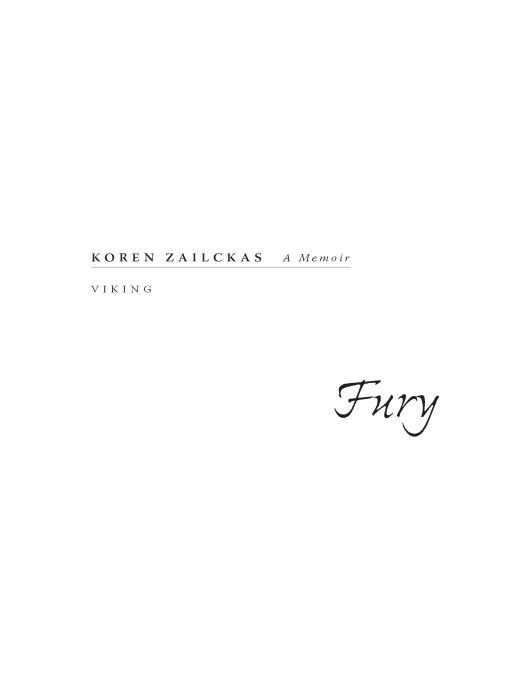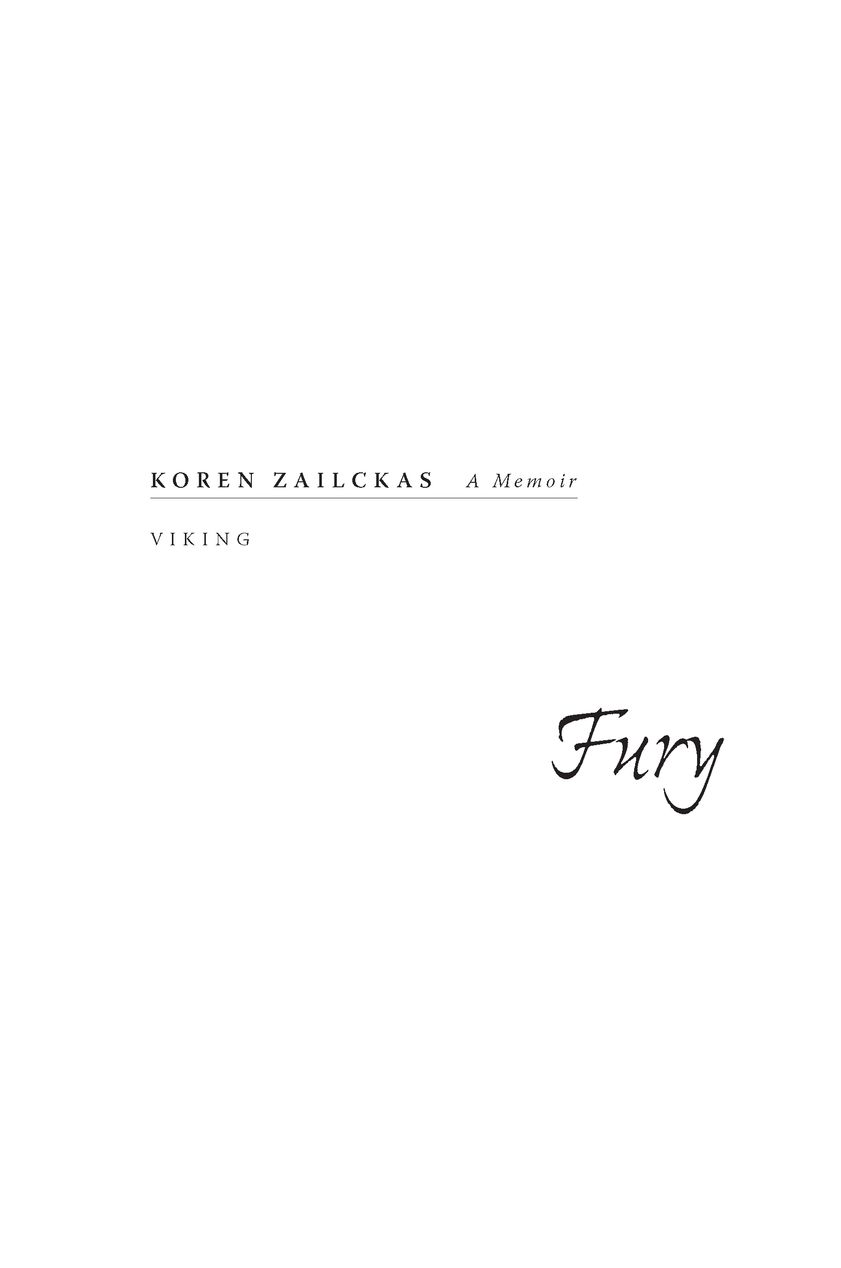Fury
Authors: Koren Zailckas


Table of Contents
Â
Â
Â
Â
Â
Â
Â
Â
ALSO BY KOREN ZAILCKAS
Smashed: Story of a Drunken Girlhood

VIKING
Published by the Penguin Group
Published by the Penguin Group
Penguin Group (USA) Inc., 375 Hudson Street, New York, New York 10014, U.S.A. ⢠Penguin Group (Canada), 90 Eglinton Avenue East, Suite 700, Toronto, Ontario, Canada M4P 2Y3 (a division of Pearson Penguin Canada Inc.) ⢠Penguin Books Ltd, 80 Strand, London WC2R 0RL, England ⢠Penguin Ireland, 25 St. Stephen's Green, Dublin 2, Ireland (a division of Penguin Books Ltd) ⢠Penguin Books Australia Ltd, 250 Camberwell Road, Camberwell, Victoria 3124, Australia (a division of Pearson Australia Group Pty Ltd) ⢠Penguin Books India Pvt Ltd, 11 Community Centre, Panchsheel Park, New Delhi - 110 017, India ⢠Penguin Group (NZ), 67 Apollo Drive, Rosedale, North Shore 0632, New Zealand (a division of Pearson New Zealand Ltd) ⢠Penguin Books (South Africa) (Pty) Ltd, 24 Sturdee Avenue, Rosebank, Johannesburg 2196, South Africa
Â
Penguin Books Ltd, Registered Offices: 80 Strand, London WC2R 0RL, England
Â
First published in 2010 by Viking Penguin, a member of Penguin Group (USA) Inc.
Â
Â
Copyright © Koren Zailckas, 2010All rights reserved
Â
Grateful acknowledgment is made for permission to reprint excerpts from the following copyrighted works:
“Mine enemy is growing old” from
The Poems of Emily Dickinson,
Thomas H. Johnson, ed., Cambridge, Mass.: The Belknap Press of Harvard University Press. Copyright © 1951, 1955, 1979, 1983 by the President and Fellows of Harvard College.
The Poems of Emily Dickinson,
Thomas H. Johnson, ed., Cambridge, Mass.: The Belknap Press of Harvard University Press. Copyright © 1951, 1955, 1979, 1983 by the President and Fellows of Harvard College.
Diary
by Chuck Palahniuk. Copyright © 2003 by Chuck Palahniuk. Used by permission of Doubleday, a division of Random House, Inc.
by Chuck Palahniuk. Copyright © 2003 by Chuck Palahniuk. Used by permission of Doubleday, a division of Random House, Inc.
Seneca: Volume I,
Loeb Classical Library Volume 214, translated by John W. Basore, Cambridge, Mass.: Harvard University Press. Copyright © 1928 by the President and Fellows of Harvard College. Loeb Classical Library is a registered trademark of the President and Fellows of Harvard College. ®
Loeb Classical Library Volume 214, translated by John W. Basore, Cambridge, Mass.: Harvard University Press. Copyright © 1928 by the President and Fellows of Harvard College. Loeb Classical Library is a registered trademark of the President and Fellows of Harvard College. ®
A Field Guide to Getting Lost
by Rebecca Solnit. Copyright © Rebecca Solnit, 2005. Used by permission of Viking Penguin, a member of Penguin Group (USA) Inc.
by Rebecca Solnit. Copyright © Rebecca Solnit, 2005. Used by permission of Viking Penguin, a member of Penguin Group (USA) Inc.
Â
Library of Congress Cataloging-in-Publication Data
Zailckas, Koren.
Zailckas, Koren.
Fury : a memoir / Koren Zailckas.
p. cm.
Continues: Smashed. New York : Viking, 2005.
eISBN : 978-1-101-44293-7
1. Zailckas, Koren. 2. AngerâCase studies. 3. Zailckas, KorenâRelations with men. 4. Separation (Psychology)âCase studies. 5. Zailckas, KorenâFamily. 6. Young womenâUnited States--Biography. 7. BuddhismâMiscellanea.
I. Zailckas, Koren. Smashed. II. Title.
B F575.A5Z35 2010
818'.603âdc22
[B] 2010005319
Â
Â
Without limiting the rights under copyright reserved above, no part of this publication may be reproduced, stored in or introduced into a retrieval system, or transmitted, in any form or by any means (electronic, mechanical, photocopying, recording or otherwise), without the prior written permission of both the copyright owner and the above publisher of this book.
Â
The scanning, uploading, and distribution of this book via the Internet or via any other means without the permission of the publisher is illegal and punishable by law. Please purchase only authorized electronic editions and do not participate in or encourage electronic piracy of copyrightable materials. Your support of the author's rights is appreciated.
Â
Penguin is committed to publishing works of quality and integrity. In that spirit, we are proud to offer this book to our readers; however, the story, the experiences, and the words are the author's alone.
FOR EAMON
Â
Â
Ubi amor, ibi oculus
Anger as soon as fed is deadâ
Tis starving makes it fat.
Tis starving makes it fat.
Â
âEMILY DICKINSON,
“Mine Enemy Is Growing Old”
PROLOGUE
Giving Up the Ghost
A story without emotion is no story at all. The writer in me knew this. But at twenty-seven, I found myself struggling with an unacknowledged anger-management hitch: Strong emotion wasn't destroying my life so much as my heart-palpitating fear of it.
“Cholerophobic.” That's what one shrink called my abnormal and unwarranted fear of getting angry, my persistent state of vanilla-beige. A Web site advertising a “trusted,” “effective” treatment for this anger disorder defined it with a salesman's flourish:
Cholerophobia is a defense mechanism created by the unconscious mind. At some point in the cholerophobe's past, there was an event linking anger to emotional trauma. Avoiding the emotion means living in fear, missing out on life experiences big and small and living a life that is only a shadow of what it might be.
I read this with a sharp pinch of despair, knowing that my anger disorder was once reinforced by drinking, an addiction that also prevented me from fully participating in my life. The pages that follow are an account of the continued aftermath of my stunted adolescence. Here is the fallout from the years spent drowning emotion with drink instead of recognizing my feelings, exploring them, and, in doing so, reclaiming my family's particular power to obliterate or redeem me. I didn't set out to write a sequel to
Smashed
, but I have lived without an awareness of my past, and every life crisis dredged up the unexamined aspects of a much older story.
Smashed
, but I have lived without an awareness of my past, and every life crisis dredged up the unexamined aspects of a much older story.
If you hear the echoes of a kid's complaint in these pages it's because this book was born of childhood emotions that never found an exit hatch during the years they might have been less mortifying and marginally more appropriate. Had these feelings come to light then, my blow-ups might have been pertinent, confiding, spontaneous, fleeting. Here, however, my festered anger is frequently accompanied by stupidity, insanity, obscenity. Honesty forces me to cringe and acknowledge these “ire” works instead of making myself more presentable. The truth is: Starved for anger's release, I first howled primitively. Rage-o-phobe turned fury fiendâmoderation never really was my thing.
I need to thank my family for vetting this account. In reading this book and its various drafts, they've been privy to the kinds of conversations that usually pass only between a person and her therapist. I'm awed by their bravery and grateful to them for respecting my desire to explore my emotions in this context, for understanding that I can't go on describing myself exclusively in their language and anecdotes. It's like going through life performing a sham accent and dressing in someone else's clothes.
My mother is a powerful presence in my life, and from my childhood I've taken her word on what she occasionally and not always unkindly called my “difficult” disposition. “Born angry.” That's what she always said of me. As proof, she describes my colicky infancy. No proffered comfort ever soothed me as a baby, she says, not her arms, a pacifier, or the Moses basket that my handy dad roped from a ceiling beam. Likewise, she's quick to remind me of my preschool years, when fear of separation, fear of strangers, fear of my own stumpy shadow tightened my dimpled arms, nooselike, around her neck.
Lacking my own memories of these early years, I always thought it would be rude to refute the ones that she had to offer. My parents seemed like the archivists of my early history, and I believed what they told me because I thought I had no means to contradict them. My memory doesn't switch on until later in my toddler years, when a fleck of chili pepper settles on my tongue by mistake. And even that first recollection brings to mind emotional Niagaras in line with what they described. I remember stinging outrage, then humiliated panic.
When I acknowledged feeling, I found a way to address the incongruity I always sensed. My folks may remember more from my days in the cradle, but I alone know what I felt as a kid. I was not born ticked off so much as simply born human and, in forbidding myself a full range of human emotions, a more malignant fury took shape. “A bad girl has never been born,” wrote Virginia Satir, the famed family therapist. “Only persons with potentials are born. Something in that human being has to be denied, projected, ignored or distorted for her to become some kind of bad, sick, stupid or crazy girl or woman.”
Throughout this account, I refer to an unrealized book. This isn't a literary device so much as an honest record of events. The book I was trying to write when I undertook this subject four years ago died on the delivery table for the same reason this record now exists: I set out to write an objective book about modern remedies for anger and I ended up with an achingly personal account of why I went looking for remedies in the first place.
From the first word, this has been an uncanny project. I wrote this book in real time, transcribing many events even as they continued to play themselves out. As the story developed, my progress began to undo my previous work. When I began telling this account, I was hiding behind the same defense mechanisms this story helped me define and forced me to part with. Many times over, writing about anger forced me to break apart my ego, my identity. Within my motivations, I found my memories. Within my memories, my emotions. Within my emotions, my kerneled essence.
I often wonder whether a biological imperative first led me to set these words down. My desire to start a family ignited some preoccupation with my natural-born one, a drive that is paralleled in nature. When, for example, a female sea turtle (or a salmon) reaches adulthood and finds herself ready to lay, she migrates back to the exact nesting ground where she was born, sometimes swimming thousands of miles to get there. The homing instinct serves an evolutionary purpose. Something worked in that spot. The conditions surrounding her birth and her earliest youthâthe tides, the temperatureâwere good enough to sustain life. She was born, after all, and she survived. She's still here.
Other books
No Known Grave by Maureen Jennings
Arrowood by Laura McHugh
Rippled by Erin Lark
Special Assignments by Boris Akunin
Cut and Run 07 Touch & Geaux by Abigail Roux
Mirrors of Narcissus by Willard, Guy
Hollywood Crows by Joseph Wambaugh
Inferno by Julian Stockwin
Wrath Of The Medusa (Book 2) by T.O. Munro
Judgment at Proteus by Timothy Zahn
